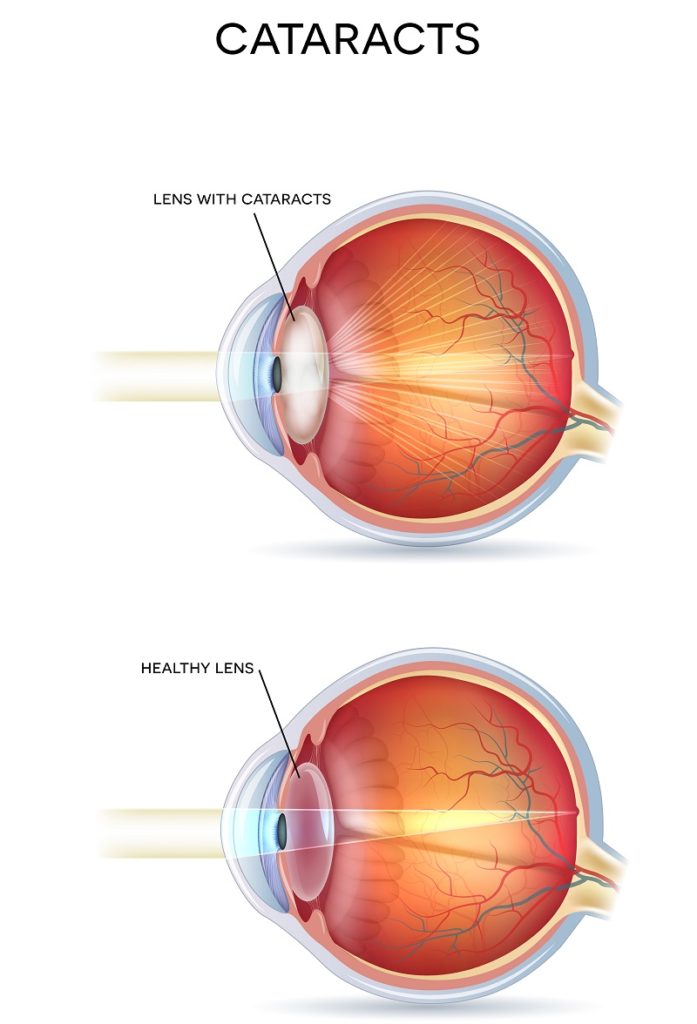
Cataracts are one of the leading causes of vision impairment, vision loss, and blindness in the United States, affecting 24 million Americans over the age of 40. As Cataract Awareness Month kicks off, our Houston cataract surgery professionals are here to bring you the latest information on treating this condition.
What Is a Cataract?
The natural lens of the eye rests behind the iris, the colored part of the eye. A healthy lens is transparent. A cataract is a medical condition in which this lens becomes clouded, which can obstruct the passage of light.
For people with cataracts, it’s like looking through a fogged up or dirty window — things tend to look blurry or hazy, and colors look less vivid. Cataracts can also make the light from the sun, indoor lamps, or automobile headlights seem very bright or glaring.
Are You At Risk for Developing Cataracts?
Being aware of the risk factors, symptoms, and treatment options for cataracts is the best way to preserve your vision, starting with regular eye exams. If left untreated, cataracts will continue to get worse and visual acuity will become more impaired.
Cataracts usually occur later in life and most progress slowly — meaning the clouding increases over months to years. Cataracts may occur in one or both eyes, and each may develop at a different rate, causing vision to vary from eye to eye.
The exact causes of cataracts are unknown. However, eye doctors have identified several possible risk factors, including:
- Aging
- Certain medical conditions, such as diabetes
- Eye Trauma
- Family history
- Prolonged exposure to sunlight/UV radiation
- Smoking
- Obesity
- High Blood Pressure
- Alcoholism
- Prenatal medical conditions
- Protracted use of corticosteroid medications
While most cataracts are related to aging, anyone can develop cataracts. In addition to age-related cataracts there are “secondary” cataracts, caused by surgery or other eye problems; “traumatic” cataracts that result from an injury; “congenital” cataracts that develop in newborns and young children; and “radiation” cataracts, caused by exposure to radiation.
Cataract Symptoms to Look Out For
Cataracts don’t cause pain, redness or tears — the symptoms sneak up gradually. Some of the common symptoms of a cataract to look out for include:
- Cloudy, blurry or dimmed vision
- Milky or yellowish spots on your pupils
- Difficulty seeing or driving at night
- Difficulty with reading or close-up work
- Changes in eyeglass or contact lens prescription
- Sensitivity to bright light and glare
- Seeing “halos” around bright light or sunlight
- Colors seem faded
- Decreased depth perception
- Double vision or multiple images in one eye
These symptoms can also be indicative of other eye problems.
Diagnosis and Treatment of Cataracts
If you are experiencing any of the early symptoms of cataracts or other changes in vision, schedule a comprehensive eye exam at the nearest Berkeley Eye Center location — the earlier the better. Visual acuity tests, dilated eye exams and tonometry to measure the pressure inside the eye are some of the exams performed by eye doctors to diagnose cataracts.
In many cases, people with cataracts are able to function normally with prescription glasses, contact lenses and other vision aids, such as brighter lighting, anti-glare sunglasses, or magnifying lenses.

Currently, surgery is the safest and most effective way to remove cataracts. In cataract surgery, the cloudy lens will be surgically removed and replaced with a new, clear, artificial one, called an intraocular lens, or IOL. This modern form of lens replacement can restore normal vision for most patients. It is not unusual for our patients to enjoy dramatically improved vision within hours of their procedure.
Can Cataracts Be Prevented?
There are currently no options to completely prevent the formation of cataracts. However, doctors recommend several strategies they believe can slow the progression of cataracts, including:
- Get regular comprehensive eye exams
- Quit smoking
- Eat healthy, especially fruits and vegetables containing antioxidants
- Wear a hat and sunglasses while out in the Sun
- Reduce alcohol use
- Keep your diabetes and other medical conditions under control
Frequently Asked Questions About Cataracts
Is cataract surgery painful?
No. Patients do not feel any pain during the procedure because eye drops or a local anesthetic are used to numb the eyes.
Can I have cataract surgery if I had LASIK?
Previous LASIK surgery or other refractive procedures will not disqualify you as a candidate for LASIK.
How long does it take to recover from cataract surgery?
While the time it takes to recover from cataract surgery can vary from person to person, it is typically a short time period. Many patients are able to return to normal daily activities as early as the day after their procedure.
Does Medicare cover cataract surgery?
At Berkeley Eye Center, our standard and premium cataract procedures are approved by Medicare but are not fully covered. Therefore, additional out-of-pocket expenses will be incurred.
Schedule An Eye Exam During Cataract Awareness Month
The best way to protect your vision is to have your eyes examined on a regular basis. Cataract Awareness Month is a great time to schedule an annual eye exam by a Berkeley Eye Center ophthalmologist, who can detect cataracts and other vision problems before you may be aware of them. The sooner you get treatment, the greater the chances of successfully reducing or preventing any cataract-related vision impairment and loss.
Don’t wait until your vision starts to become cloudy to get help. If it’s been a while since you’ve had your eyes looked at, call Berkeley Eye Center to schedule an appointment with one of our highly trained Houston eye doctors. With locations all over Houston and surrounding communities like Pearland, Katy, the Woodlands and Kingwood, there’s sure to be a Berkeley Eye Center of Houston close to you.
